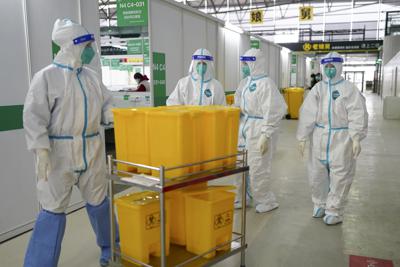BEIJING (AP) — COVID-19 cases in China’s largest city of Shanghai are still rising as millions remain isolated at home under a sweeping lockdown.
Health officials on Sunday reported 438 confirmed cases detected over the previous 24 hours, along with 7,788 asymptomatic cases. Both figures were up slightly from the day before.
While small by the standards of some countries, the daily case numbers are some of the largest since the virus was first detected in the central city of Wuhan in late 2019.
Shanghai with its 26 million people last week began a two-stage lockdown, with residents of the eastern Pudong section supposed to be allowed to leave their homes Friday, while their neighbors in the western Puxi section underwent their own four-day isolation period.
Despite that assurance, millions in Pudong continue to be confined to their homes amid complaints over food deliveries and the availability of medications and health services
Notices delivered to residents said they were required to self-test for COVID-19 daily and take precautions including wearing masks at home and avoiding contact with family members — measures not widely enforced since the early days of the pandemic.
A city official last week apologized in response to complaints over the government’s handling of the lockdown, and a vice premier made sweeping demands for improvements during a tour of Shanghai on Saturday.
Sun Chunlan, who sits on the ruling Communist Party’s Politburo, urged “resolute and swift moves to stem the spread of COVID-19 in Shanghai in the shortest time possible,” the official Xinhua News Agency reported.
However, Sun stressed “unswerving adherence” to China’s hardline “zero-COVID” approach, mandating lockdowns, forced isolation of all suspected cases and mass testing, even while acknowledging the social and economic toll that is taking.
“It is an arduous task and huge challenge to combat the omicron variant while maintaining the normal operation of core functions in a megacity,” Sun said.
She called for safeguarding key industries and institutions and the functioning of supply and industrial chains in the commercial hub, along with ensuring “people’s basic living conditions and normal medical needs.”
State media reports indicate president and Communist Party leader Xi Jinping is directing the continuing tough approach, while seeking to avoid further damage to the sputtering economy and ensure overall stability ahead of a key party congress expected for November.

